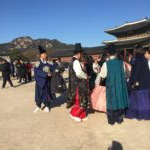Seoul, Korea
Wednesday 20 November 2019
Barely 27 degrees this morning, and it was cold. I trotted back to Gyeongbokjung to find the lovely English-speaking tour guide there, whose American name is Jennie. She not only made some identifications and taught me more, but she inveighed her expert contacts into identifying items and has taken on the job of contacting others to help her ( and help me) in more identifications. How lovely to have someone else — someone who knows —doing this research.
Gyeongbokgung, the royal palace, has a long and royal history. It was built by and for the Joseon Dynasty, which held power from 1392 until 1912, an impressive stretch, and I believe the longest reign ever held by any one royal family. The word “Gyeongbok” in translation means “The new dynasty will be greatly blessed and prosperous” and “gung” means palace—an efficient use of words, I daresay. But then, Geunjeongjeon the name of the main throne room of Gyeongbokgung, means “All affairs will be properly managed if your Majesty demonstrates diligence.”
Gyeonbokgung was founded n 1395, expanded in 1492, and burned to the ground by the Japanese in 1592. It was reconstructed in 1867 and removed by the Japanese in 1915. Reconstruction began once again in 1990 on its native and present site, and the reconstruction seen today completed in 1910.
The Korean populace apparently love the palace as much as the tourist, and everyone loves the recreation of the Changing of the Guards ceremony, usually held twice a day at Gyeongbokgung and the other palaces. As you can see from these photographs below, the uniforms are bright; the banners colorful and waving; and the music, which you cannot hear, is very loud and very brassy and punctuated by regular loud thumps on the highly decorated drum, the thumps requiring a full-body workout by a full bodied Korean man.
Sorry ladies, but no females involved in these exercises; this is strictly an all-boys show. “You go home now and attend to your work, the loom and the spindle, and tell the waiting-women to get on with theirs,” says Hector to his wife, Andromache, in the Iliad. “War is men’s business.” FMR: It should not be anybody’s business.









